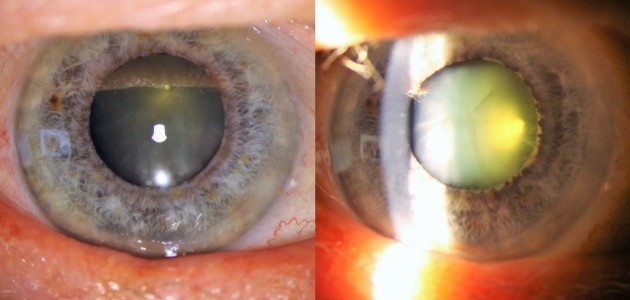Wondering what to expect with Cataract Surgery?
It’s common to get nervous upon finding out you need cataract surgery. However, a good ophthalmologist will always explain the process clearly and detail what to expect with cataract surgery
At KindSIGHT we take our role seriously when it comes to supporting patients before, during and after cataract surgery. She also addresses any questions or concerns with compassion.
The following outlines our team’s process, the purpose of cataract surgery and the patient experience when it comes to this sight-restoring procedure.
The benefit of cataract surgery
A cataract occurs when the natural lens of the eye becomes cloudy. Typical symptoms associated with cataracts include increasing difficulty reading small print, objects in the distance looking blurred, loss of confidence driving at night, sensitivity to bright lights and changes in colour perception.
Cataract surgery involves the removal of the cloudy natural lens (cataract) which is then replaced with a clear, customised artificial lens made from plastic polymer. This is called an intraocular lens (IOL).
Thanks to modern technology, cataract patients today have the ability to choose from a variety of IOLs and tailor-made refractive solutions that can provide improved vision to suit their individual lifestyle needs. For example, personal goals from cataract surgery might vary from being able to drive at night, read better, or be able to participate in certain hobbies or activities. Cataract patients can decide what is most important to them and can even decide to live a lens-free lifestyle. Imagine living life in freedom without glasses or contact lenses!
Understanding your options
Before any surgery takes place, we will perform comprehensive testing of your eyes and you will have a thorough examination by an ophthalmologist. KindSIGHT’s philosophy is to know everything possible about your eyes prior to surgery and we have invested in state-of-the-art medical technology to facilitate this. For example, we perform a macula scan using our Heidelberg Spectralis OCT machine – the same technology NASA uses on the International Space Station (read more about it here).
Once we have all the information about your eyes, our eye care team will discuss the results with you and present the appropriate options for treatment. This includes helping you to make informed decisions about whether surgery is right for you and which IOLs may suit your lifestyle.
At KindSIGHT, our team takes a caring and compassionate approach to patient support. If cataract surgery is an option, our staff will talk you through the costs, bookings and paperwork involved in detail.
This is what you can expect with Cataract Surgery
Your surgery will take place in a day hospital facility. Patients should generally plan to be there for about three hours. Afterwards, you will need a family member or friend to pick you up upon discharge.
The week before
During the week leading up to your scheduled surgery, the KindSIGHT team will contact you to confirm the details of your surgery, including your admission time and fasting instructions.
Checking in
The administration team at the hospital will greet you and finalise your paperwork, then introduce you to the nursing staff, who will start you on a series of pre-operative eye drops.
Pre-operative preparation
The anaesthetist will talk you through the process and administer an intravenous sedative. This twilight anaesthetic means you will feel no pain during the surgery. Often you will have no memory of anything happening until you are recovering in the recovery bay. Nice and easy, right?!
The surgery – cataract removal
The cataract surgery itself usually only takes about 20 minutes. Some patients recall seeing some bright lights, but most of the time it’s over before you realise it has started.
Recovery
When you come out of the surgery, you will spend some time in the recovery area. The nursing staff will give you something to eat and drink. Your eye will have a patch over it (so don’t panic when you can’t see out of that eye) and it is normal for the eye to feel strange or even mildly uncomfortable.
The next day
At your first post-operative appointment, your eye patch will be removed, the eye cleaned and your vision will be checked. You will be talked through administering your post-op eye drops. This will be followed by an examination by an optometrist to check that your eye is settling well.
1 week, 1 month and 1 year
Post-operative appointments are typically scheduled approximately 1 week, 1 month and 1 year after surgery. At each appointment, your vision and eye pressure will be tested, and your eye will be examined. Sometimes, extra scans or photos are performed.
Round two
Patients who have cataracts in both eyes are often so delighted with their improved vision following the first surgery that they are eager to have their second cataract removed as soon as possible. Usually, this will happen between two weeks and one month after the first surgery. In the interim, vision can be a little unbalanced, and you may need to visit your optometrist to have one lens removed from your glasses.
Top tips during recovery
- It’s important to rest for the first 48 hours after your operation and avoid signing any legal documents or driving a vehicle
- Blurred vision is normal for the first few weeks, but this should improve slowly each day
- It is normal to see light/shadows in the periphery of your vision. This is caused by the edge effect of the new lens
- Dry eye symptoms, e.g. irritation, watering, gritty, burning sensations, can be exacerbated over the first few months
- Your eye is at highest risk of infection for the first 2 weeks after surgery. Therefore, keep physical activity to a minimum and avoid dirty environments like the garden, beaches and swimming pools.
- Wear sunglasses for the first month after surgery, to help with light sensitivity
The good news is, recovery from routine cataract surgery is generally very quick. However, it can still take up to 4-6 weeks for vision to “fine-tune” and completely settle. After this period of time, you will be able to visit your optometrist to update your glasses. Perhaps you will be able to throw away your glasses for good!
Click here for more information on cataracts or contact KindSIGHT on 07 3063 1600.





